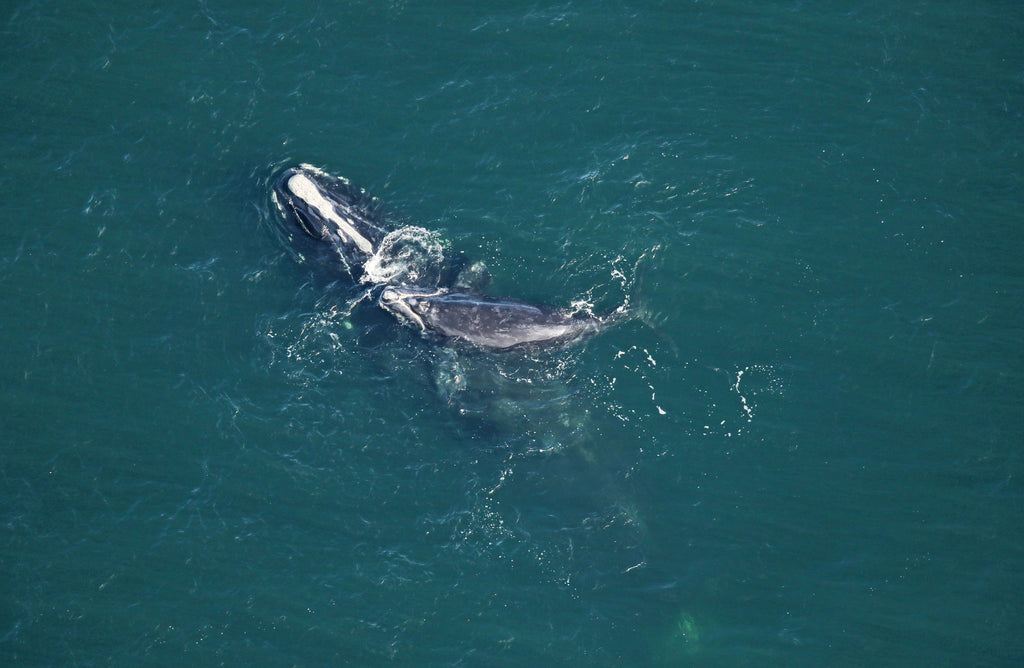NORTH ATLANTIC RIGHT WHALES

Photo credit: FWC under NOAA permit #20556-01. Description: Catalog #3230 ‘Infinity’ and calf were sighted 16.5 nautical miles off Amelia Island, FL on January 17, 2021. Catalog #3230 is 19 years old and this is her 1st calf.
IUCN Red List Status: Critically Endangered & Decreasing
Fun Facts:
- Right whales are filter feeders whose diet consists mainly of pelagic crustaceans, krill, and copepods.
- Unlike other baleen whales, right whales are known to swim with their mouths completely open to trap prey in their specially angled baleen.
- Like all whales, right whales are mammals who give birth to live young.
- North Atlantic right whales are one of three known right whale species.
- These whales migrate thousands of miles to warmer waters every year to give birth to their young.
- Right whales can live up to 70 years old.
Not So Fun Facts:
- Only 366 North Atlantic right whales are left in the wild today, making them one of the most critically endangered animals on the planet.
- Named the "right" whale because they were the easiest whale for commercial whalers to hunt.
- Vessel strikes and entanglement in commercial fishing gear are the lead killers of right whales.
- Climate change and oceanographic changes are a lead contributor to the decline in North Atlantic right whale reproduction.
- The abundance of human-made noise within the North Atlantic can reduce right whales' ability to navigate, communicate with one another, and avoid predators.
How Can I Help Protect Right Whales?
-
When on a boat where you can see a North Atlantic right whale, respect their space. Do not disrupt, take selfies with, swim with, jump on, touch, grab, poke, or harass them in any way. When in doubt follow the Golden Rule.
- Embody this mindset and remind others to respect our oceans and marine life if you find yourself in situations where they are not.
- Remember that every experience you have with a wild animal no matter the proximity is an incredible experience that you are privileged to have.
- If you witness a whale in distress, entangled, has been hit by a vessel, or is dead call NOAA's Marine Mammal Entanglement Hotline: (866)755-6622.
- Make educated choices as a consumer
- Support companies and brands that are sustainable and aren't known for marine life casualties.
- Choose ecotourism trips that do not exploit or endanger marine life
- If you choose to eat seafood, choose locally sourced and sustainably caught seafood from fisherman who use sustainable and safe fishing gear. The app Seafood Watch can help you make educated choices when you visit your local seafood market.
- Sign petitions collecting signatures in support of protecting right whales.
- VOTE! Elect local, state and federal officials who are going to:
- Implement and vote to pass bills and policies that will protect whales, and create new marine sanctuaries that will help their populations increase.
- Implement both Green and Blue New Deals to protect our environment and combat the climate crisis.
- Implement bans on single-use plastic.
- Support local legislation that protects coastal habitats.
- Support local legislation that protects against unsustainable commercial fishing practices, regulates boat traffic and minimizes human-made ocean noise.
- Use re-usable items instead of disposable plastic ones.
- Eliminate single-use plastic from your everyday lifestyle.
- Stop using any kind of inflatable helium balloons - they end up in our oceans and can kill marine life if ingested.
- Cut up straws, 6-pack can rings, or any bags that could entrap marine life.
- Educate yourself about North Atlantic right whales, the climate crisis, the plastic crisis, and commercial fishing bycatch.
- Go out into the world and educate others!
Learn More About:
- Additional North Atlantic Right Whale Information (As Well As The Affects Climate Change, Boat Traffic & Commercial Fishing have on reducing their populations.)
- How Plastic Pollution Affects Whales



